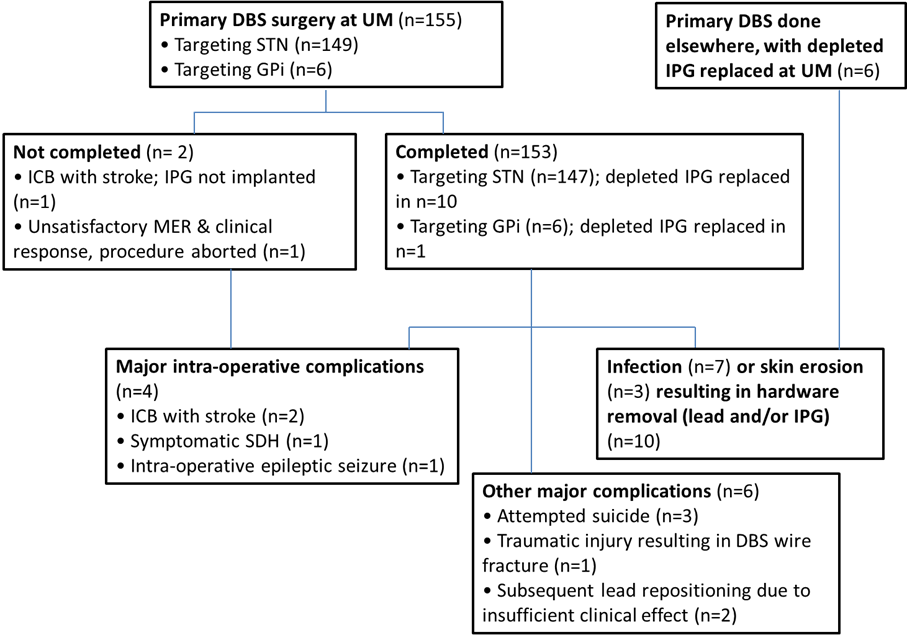Category: Surgical Therapy: Parkinson's Disease
Objective: We aimed to characterize the DBS cohort and outcomes at a quaternary medical centre in Malaysia.
Background: Deep brain stimulation s an established treatment for Parkinson’s disease (PD) and several other movement disorders. However, the availability of DBS in Southeast Asia remains low due to its high cost and limitations in expertise and facilities. In parallel, there is paucity of data on DBS utilization and outcomes in this region.
Method: We conducted a retrospective chart review on all DBS-related surgeries at the University of Malaya, Malaysia since 2004 (n=161 patients; 312 leads, 173 implantable pulse generators [IPG]). Clinico-demographic and outcome data focusing on post-operative medication reduction and complications were collected.
Results: Out of 155 new bilateral DBS surgeries, 147 PD patients underwent subthalamic nucleus DBS for PD, while six had globus pallidus interna DBS (primarily for dystonic conditions). The mean age at diagnosis for PD patients (n=150; 59.0% male; 74.8% Chinese) was 48.9±8.5 years. The median age at first DBS surgery and disease duration were 58.9 [IQR:11.8; range:35.8-77.3] and 8.7 [IQR:5.9; range:2.3-24.3] years, respectively. Only 17 (11.1%) were government-funded; the rest were self-paid or reimbursed by private health insurance. Five PD patients were found to have monogenic LRRK2-, PRKN-, or GBA-related PD (i.e., 16.7% of n=30 patients tested. At 6-12 months post-DBS, levodopa-equivalent daily dosage was reduced by 416.0 [427.9] mg/day (p<0.001; n=116); this was ≥50% and ≥30% in 42.2% (n=49) and 69.8% (n=81) of patients, respectively. Three patients (1.9%, n=155) had symptomatic intracranial hemorrhage, resulting in stroke in two. Seven patients (4.3%, n=161) and three (1.9%) had infection and skin erosion resulting in lead and/or IPG removal. On average, 19 new DBS surgeries were performed annually from 2017-2022. Of the 133 PD patients operated in the past decade, 28 (21.1%) had disease duration <4-5 years, none of whom evolved into a Parkinson-plus syndrome.
Conclusion: To our knowledge, this is the largest report on DBS from Southeast Asia. The procedures were effective, and complication rates in keeping with international standards. A novel aspect of our study was the inclusion of a substantial number of patients with short duration of PD. Our study also highlights inequity of access to device-aided therapy, with the financial burden largely borne by patients/families.
To cite this abstract in AMA style:
AM. Dy Closas, AH. Tan, JL. Lim, YW. Tay, A. Ahmad-Annuar, K. Lohmann, C. Klein, CY. Cham, KA. Muthusamy, SY. Lim. Single-center experience of deep brain stimulation (DBS) surgery in Malaysia [abstract]. Mov Disord. 2023; 38 (suppl 1). https://www.mdsabstracts.org/abstract/single-center-experience-of-deep-brain-stimulation-dbs-surgery-in-malaysia/. Accessed December 23, 2025.« Back to 2023 International Congress
MDS Abstracts - https://www.mdsabstracts.org/abstract/single-center-experience-of-deep-brain-stimulation-dbs-surgery-in-malaysia/

